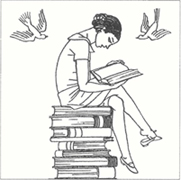Ex Libris: Confessions of a Common Reader
Read Ex Libris: Confessions of a Common Reader Online
Authors: Anne Fadiman
Tags: #Fiction, #General, #Literary Criticism, #Essays, #Books & Reading, #Literary Collections, #Books and Reading, #Fadiman; Anne


Also by Anne Fadiman
The Spirit Catches You and You Fall Down
X
L
I B R I S
C
ONFESSIONS OF A
C
OMMON
R
EADER
A
NNE
F
ADIMAN

The essays in this book appeared, in slightly different form, in
Civilization
magazine.
For Clifton Fadiman
and Annalee Jacoby Fadiman,
who built my ancestral castles

 C
CONTENTS


P
R E F A C E

W
hen the Irish novelist John McGahern was a child, his sisters unlaced and removed one of his shoes while he was reading. He did not stir. They placed a straw hat on his head. No response. Only when they took away the wooden chair on which he was sitting did he, as he puts it, “wake out of the book.”
“Wake” is just the right verb, because there is a certain kind of child who awakens from a book as from an abyssal sleep, swimming heavily up through layers of consciousness toward a reality that seems less real than the dream-state that has been left behind. I was such a child. Later, as a teenager under the influence of Hardy, I could not fall in love without classifying the boy as a Damon or a Clym. Later still, I lay with my husband (a Clym) in a bed that was lumpy with books, hoping the delivery of our first child would resemble Kitty’s birth scene in
Anna Karenina
but fearing it might be more like Mrs. Thingummy’s in
Oliver Twist
.
I began to write
Ex Libris
when it occurred to me how curious it was that books are so often written about as if they were toasters. Is this brand of toaster better than that brand of toaster? At $24.95, is this toaster a best buy? There is nothing about how I may feel about my toaster ten years hence, and nothing about the tender feelings I may yet harbor for my old toaster. This model of readers as consumers—one I have abetted in many a book review myself—neatly omits what I consider the heart of reading: not whether we wish to purchase a new book but how we maintain our connections with our old books, the ones we have lived with for years, the ones whose textures and colors and smells have become as familiar to us as our children’s skin.
In
The Common Reader
, Virginia Woolf (who borrowed her title from a phrase in Samuel Johnson’s
Life of Gray
) wrote of “all those rooms, too humble to be called libraries, yet full of books, where the pursuit of reading is carried on by private people.” The common reader, she said, “differs from the critic and the scholar. He is worse educated, and nature has not gifted him so generously. He reads for his own pleasure rather than to impart knowledge or correct the opinions of others. Above all, he is guided by an instinct to create for himself, out of whatever odds and ends he can come by, some kind of whole.” This book is the whole that I have attempted to create from the thousands of odds and ends that crowd my sagging bookshelves.
I wrote these eighteen essays over a period of four years. They are presented here in the order in which they were written, with the exception of the last two, which have exchanged places. I have left the facts as they were; for example, William Kunstler was alive when I wrote about him, so he remains alive in these pages. Over the course of those years, my son was born, my daughter learned to read, my husband and I turned forty, my mother turned eighty, my father turned ninety. Our books, however—even the ones printed long before we were born—remained ageless. They recorded the passage of real time, and because they reminded us of all the occasions on which they had been read and reread, they also reflected the passage of the preceding decades.
Books wrote our life story, and as they accumulated on our shelves (and on our windowsills, arid underneath our sofa, and on. top of our refrigerator), they became chapters in it themselves. How could it be otherwise?
A.F.
 M
M
A R R Y I N G
L
I B R A R I E S

A
few months ago, my husband and I decided to mix our books together. We had known each other for ten years, lived together for six, been married for five. Our mismatched coffee mugs cohabited amicably; we wore each other’s T-shirts and, in a pinch, socks; and our record collections had long ago miscegenated without incident, my Josquin Desprez motets cozying up to George’s
Worst of Jefferson Airplane
, to the enrichment, we believed, of both. But our libraries had remained separate, mine mostly at the north end of our loft, his at the south. We agreed that it made no sense for my
Billy Budd
to languish forty feet from his
Moby-Dick
, yet neither of us had lifted a finger to bring them together.
